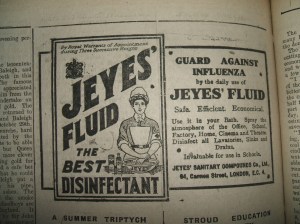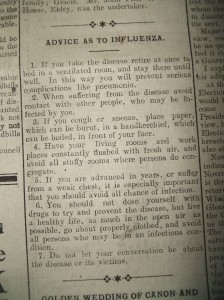The influenza pandemic which spread throughout the World as the Great War was drawing to a close is notorious to this day for having killed more people than the fighting did. Aided by troop movements, the displacement of populations, malnutrition and the general levels of stress generated by conflict, the disease swept through communities, killing indiscriminately. To this day, the medical authorities fear the emergence of another strain of ‘flu as deadly as that a century ago.
It is interesting to consider how the local papers perceived the outbreak in this area.
According to the Stroud News, the problem was that the ‘flu ‘developed easily into pneumonia’. The paper itself was tragically affected – the Journal wrote sympathetically of the contagion at its rival’s offices, where the previous Monday, only two staff had been well enough to be on duty. It had fallen to the Journal and other local printers to help get the week’s edition out. One member of staff, Norman Barnes, succumbed to the illness, as did his wife, leaving a small child orphaned. The wife of a linotype operator there, Mrs Wynn, also died, leaving young children.
In the 11th October edition of the Journal, ‘Jonathan’ wrote:
Stroud is at the mercy of the foe in the form of acute influenza, and workshops, factories and offices are being devastated in every direction. Not for twenty years has this district been attacked by such a severe epidemic, People have acquired the habit of dignifying all severe colds with the name of influenza, but the malaria-like disease which is doing its worst in our midst today is unquestionably the ‘real thing’. Its symptoms are quite unmistakable – excruciating and sudden headache, bloated face and suffusion of the eyes with the usual accompaniment of catarrh of the nose and throat. The liver also quickly becomes affected, producing what appears to be a bad bilious attack, and the temperature rises alarmingly. If the attack runs its normal course, the patient is soon restored to health again, but ubfortunately there are apt to be complications such as pneumonia. Immediately a victim shows any signs of having contracted influenza, the only safe place is bed with hot water bottles until medical aid is procured…People while still in good health may safely protect themselves against infection, I understand, by taking one tabloid (two grains) of quinine each morning.
All elementary schools in the area were closed, and under-12s were banned from cinemas.
‘Flu was presumably responsible for the sudden and untimely deaths of Maggie Weare (née Whiting) and her baby daughter, which occurred towards the end of October – Maggie had been fit and well and attended France Lynch church the Sunday before she died. Less than a week later, on the next Saturday, her funeral was held there. A Mrs Rowles, of Chalford Hill, was another victim, and again, the suddenness of the death was emphasised.

